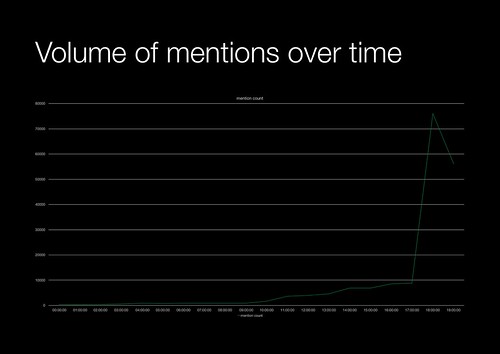From Supreme to Gucci: How North Face uses big-name collaborations to drive ‘brand heat’ – Glossy – Tim Hamilton, North Face’s head of global creative, said it typically does two collaborations per year, at most. In addition to its upcoming collab with Gucci, North Face has an ongoing collab with Supreme that started in 2015. And it released collabs with athletic brand Brain Dead and MM6, the sportswear line of Maison Margiela, in August. Hamilton said the brand’s collaborations typically require a lead time of 1-2 years and are almost always manufactured and produced by North Face. The MM6 collab, for example, began with discussions between Hamilton and the Margiela design team in 2019. – This lead-up time probably explains the balance in their collabs between hype and steadier brands. Hence no Virgil Abioh or Yeezy deal with North Face. Abioh has flirted with Canadian technical brand Arcteryx; which is owned by Chinese sports and outdoor clothing conglomerate Anta – who have a lot of cash. It is interesting that nothing has come from Abioh’s visual love letter so far.
Op-Ed | New Balance Collabs Are Second to None This Year – New Balance places an emphasis on “aligning with brands that are authentic in their space and have substance behind their message.” New Balance’s roster of collaborators represent a wide range of aesthetics, communities, and subcultures, meaning the brand can speak to a variety of consumers based on what product has been matched with which collaborator. In a sense, putting together a New Balance sneaker collaboration is like a game of exquisite corpse. “We’re able to keep product executions and stories fresh while creating different followings for each type of partnership,” – you could argue that adidas and Nike’s deals with Yeezy and Off-White relegate adidas and Nike to little more than original equipment manufacturers (OEMs). But New Balance also doesn’t have the deep pockets to go up against adidas and Nike head-on. That lack of deep pockets also affects North Face as well. I am surprised that the North Face and New Balance haven’t collaborated, though part of the issue maybe New Balance’s Danner Boots business. This competes somewhat with North Face’s boots business, but they have a very different aesthetic appealing to a different audience. North Face is owned by VF Corporation with sister brands Dickies, Timberland and JanSport. This means that brand collabs for North Face are probably complex politically.
A millennials love affair: China’s second-hand luxury goods market booms | Reuters – yes Chinese like new things like new apartments. Yes but: Chinese luxury consumers have become more sophisticated. Chinese consumers have travelled and seen the pre-owned market like Milan Station and BRAND OFF in Hong Kong and Japan respectively. In absolute terms middle class wages are lower in China still than the US; yet this isn’t reflected in luxury product pricing
Alibaba Takes Over China’s Top Hypermart Chain for $3.6 Billion – Bloomberg – interesting that Alibaba is working on an offline retail strategy
Robert Lighthizer Blew Up 60 Years of Trade Policy. Nobody Knows What Happens Next. — ProPublica – I am not normally interested in publishing about politics, but this article on US trade policy is an interesting starting point to think about the current debacle
Revisiting Lyn Collins’ “Think About It” – Micro-Chop – great essay. Its also good to see how the edits of Ultimate Breaks and Beats played a role in popularising the ‘think’ break
Hong Kong walks: discovering traditional, trendy Tai Hang | Financial Times – it makes me ‘home sick’ as Hong Kong island was my home for a while
Baaaa for business: Princess Diana’s iconic sheep sweater is back | Financial Times – its interesting that luxury brands are now raiding not just archives but childhood memories for cues. Also the convoluted customer journey outlined in the article for the original purchase via a bridesmaid’s mother
Debate over vegan ‘sausages’ and ‘burgers’ heats up ahead of EU vote | Financial Times – unsurprising given the size of the beef and pork industries in the European Union
WPP back on hunt for deals, says chief | Financial Times – Read’s challenge is to win back investors who think agency holding groups are struggling with multiple structural tests: cost-cutting and clients taking business in-house, competition from consultancies such as Accenture, and waning clout as middlemen in digital ad markets dominated by Google and Facebook. WPP’s share price is 65 per cent lower than its 2017 peak, and has fallen more than a third since the pandemic battered the economy. The three-year decline is a more severe than at rivals such as Omnicom and Publicis. Meanwhile, investors have flocked to the simpler growth story of adtech providers such as The Trade Desk, which this year has soared to almost three times WPP’s market value on a tiny fraction of its revenues. The £2bn market capitalisation of Sir Martin’s S4 Capital, a digital-only advertising group, is almost a quarter of WPP’s value even though it generated less than three per cent of its £12.4bn sales in the year to June 30. – a number of things from this interview. The Trade Desk has a lot of heat around it, WPP attempted to do this with Xaxis but has got little credit. Read tried to spin that Accenture and WPP have sweet spots at different points in the economic cycle. Hence the comment about Accenture being good at cutting marketing costs.
Mr Read’s pitch is that WPP has combined its traditional creative strength with the tech expertise to build ecommerce platforms for clients such as Sainsbury’s, and become the single biggest integrator of Adobe’s software. “Our goal is to be to revenue growth what Accenture is to cost reduction,”
Chinese-Americans campaign for Trump on WeChat | Financial Times – it is becoming increasingly difficult to organise on WeChat, not only because of the looming US ban but also because of Chinese censorship. Simple WeChat filters for sensitive terms such as “democracy” can detect articles about US politics. Sometimes when Mr Ming sends articles to his groups, those with Chinese-registered phone numbers on their WeChat accounts cannot receive the links, no matter where they are in the world. Ms Wen, who used WeChat in 2016 to organise a door-knocking campaign for Mr Trump, was glad to shift away from the platform this year. “I know it is completely surveilled. Nowadays I mostly use Telegram,” she said, referring to the encrypted messaging app. – interesting move to Telegram, mirrors what I saw in my Hong Kong friend network after the Hong Kong National Security law was passed
Google’s new ‘hum to search’ feature can figure out the song that’s stuck in your head – The Verge – now this is clever
The future of fashion week? Look to Shanghai | Vogue Business – Shanghai Fashion Week, which pioneered digital pivots like live streaming, returns today as a largely physical event, featuring around 90 brands across a number of venues, including its main stage in fashionable shopping district Xintiandi and emerging designer platform Labelhood
How to steer clear of discounts this holiday season | Vogue Business – “Markdowns have almost single-handedly ruined our industry,” says Hewitt. “They train the consumer not to buy in-season because they can come back in three months and get a discount. It’s a vicious cycle.” – during the 2008 recession Rolex reputedly bought back watches in its retail and wholesale channels. And then recycled them
Kibbles & Bytes #1122: Apple Releases Four iPhone 12 Models and the HomePod mini – Don Mayer nails the assessment of 5G in the latest edition of his newsletter.
Why a new generation of challenger brands need to rethink how to challenge | A Little West of Centre – Blands. That’s what Ben Schott, writing for Bloomberg, coined them. And what a coining it is. The new generation of humble, conscious, in-it-to-sell, underdog companies, sporting D2C models, consumer champion narratives, minimalist aesthetics, affordable luxury positionings and post-choice selling techniques (this is THE mattress, that is THE toothbrush).
Sony Launches SR Display: You Can See 3D Pictures Without Wearing 3D Glasses – Gizchina.com – really interesting technology
Indonesia’s central bank hints burglary in e-wallet player – consumers should look at the track record of providers before using them to save large amounts of money. Indonesia’s total e-wallet transaction value size is expected to reach US$15 billion by 2020, according to a recent report by The Asian Banker
Problem Solved #13: A lesson in tackling bloody taboos from Bodyform | The Drum – the result was to present the viewer with flame-engulfed apartment of a perimenopausal women; a monster ripping at an endometriosis sufferer’s uterus; a ‘flood gate’ moment following an unexpected sneeze; a woman who has chosen not to have children; and the often-turbulent journey of trying to conceive
Diane von Furstenberg: Interview | Vanity Fair – The iconic wrap dress, designed in 1974 and sold more than 15 million times since, made von Furstenberg an overnight sensation and began a dialogue with women that she has maintained ever since, in a large part through admirable philanthropic efforts, including the annual DVF awards. Now she’s taking that dialogue to the podcast, a medium she champions for its value in shifting the focus away from appearance.
British Airways Avoids Huge £180 Million Data Breach Fine for Hack That Compromised the Personal Details of Over 400,000 Customers – good for BA given airlines are haemorrhaging cash at the momen. I am worry about the message that this sends to large corporates and customer data
Shenzhen — Justin McGuirk – pretty much nails how I found Shenzhen over the decade that I visited regularly. More on Shenzhen related posts here.
Facial recognition data leaks are rampant in China as Covid-19 pushes wider use of the technology | South China Morning Post – interesting that this is being collected by non-state actors such as property management companies and schools as well as the state bodies
iPhone 12 launching without earbuds or wall chargers is compared to eating without chopsticks in China | South China Morning Post – I was expecting this as Chinese consumers are value orientated, brands focus on ‘client delight’ and there is a culture of free gifts with products. So taking items out of the box and the green explanation won’t wash
Beijing 1986: portraits of a forgotten China | Financial Times – amazing photos from 1986.
Shenzhen/Huawei: the other Bay Area | Financial Times – The impression of military manoeuvres by alternative means was reinforced by Tencent, another Shenzhen resident. It was among big Chinese social and video platforms including iQiyi and Weibo, that simultaneously cancelled the livecast of Apple’s iPhone 12 launch – a small example of the nexus between the Chinese government, corporate decision-making influenced by the government and an undercurrent of Han nationalism


